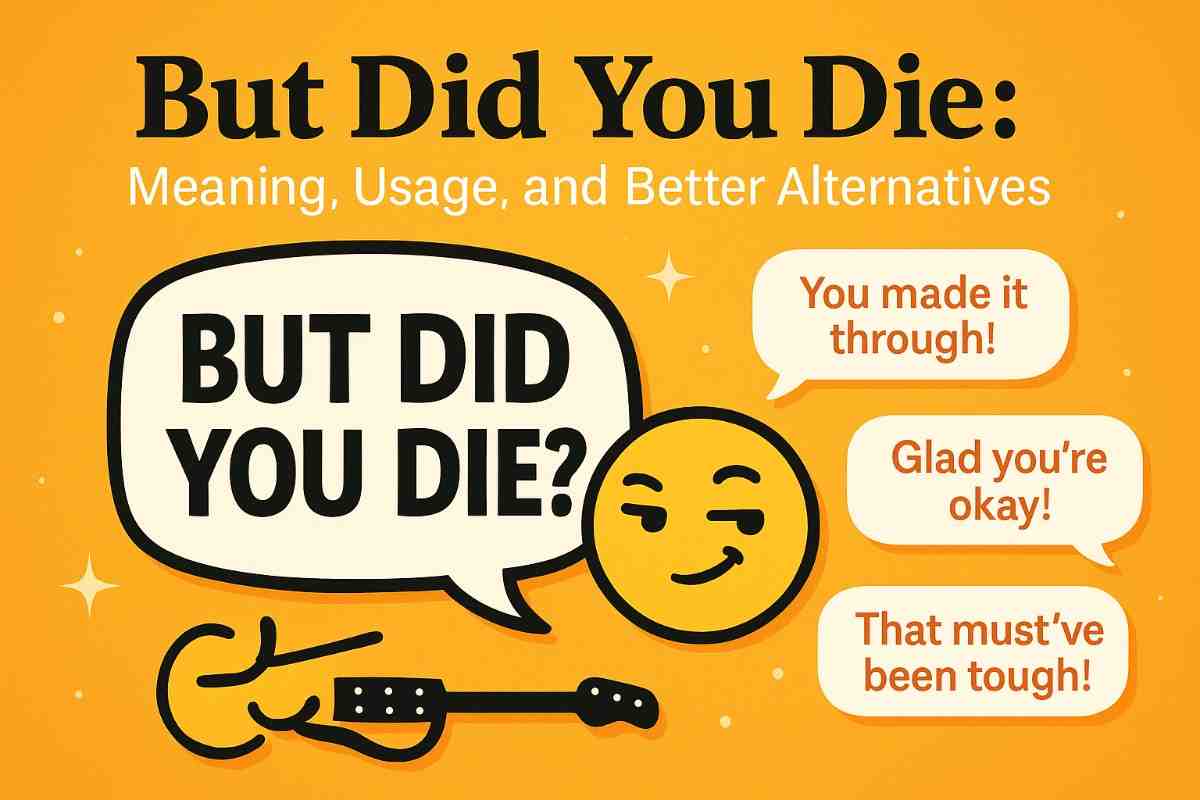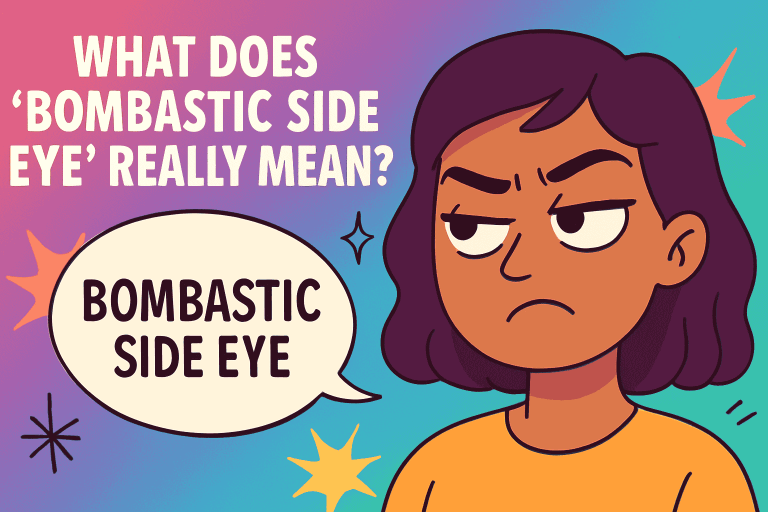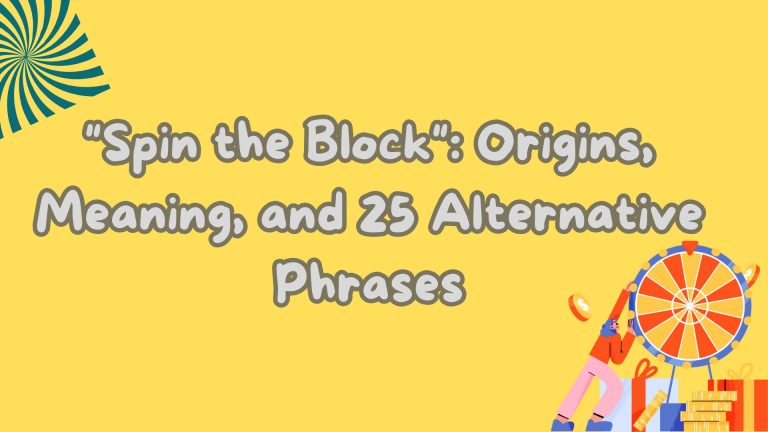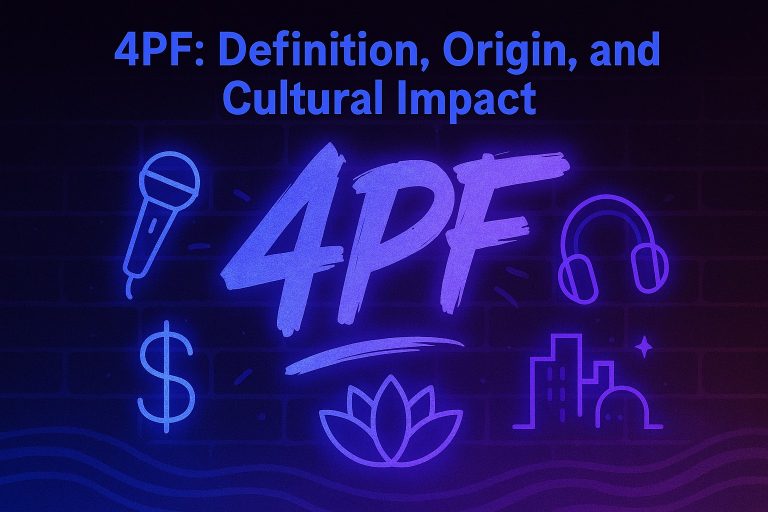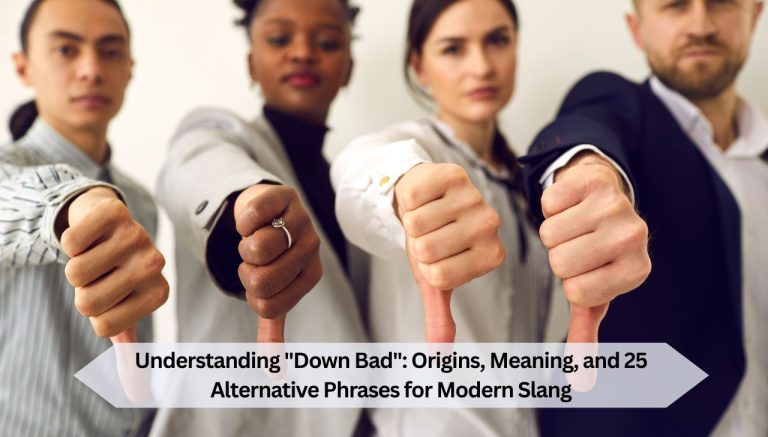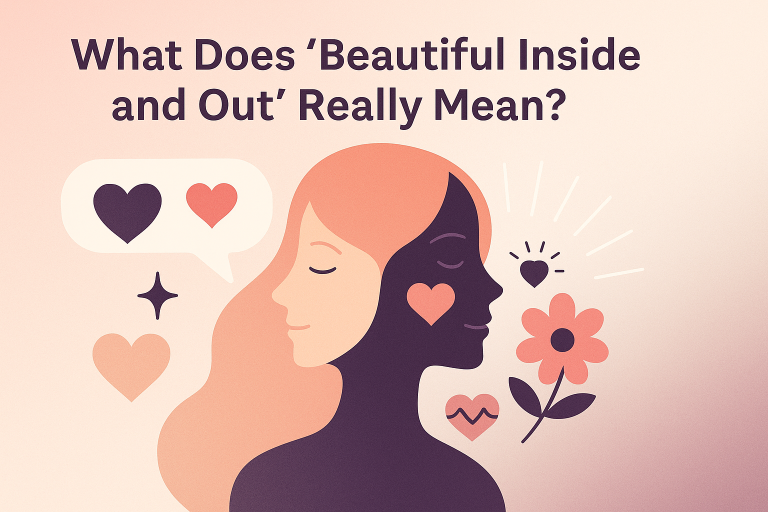But Did You Die: Meaning, Usage, and Better Alternatives
You’ve probably heard someone say, “But did you die?” after a stressful or uncomfortable experience. It might have been a friend after a tough workout or a co-worker joking about a rough deadline. It’s often meant to lighten the mood. But sometimes, it feels dismissive or even rude.
So, what’s the deal with this phrase? Should you use it? Are there better, more professional alternatives?
This guide breaks it all down.
What Does “but did you die” Mean?
At its core, “but did you die?” is a sarcastic way of saying, “It wasn’t that bad.” It often follows a complaint or story about something hard or annoying. The phrase dismisses the struggle and points out that the person survived—so it’s not worth fussing over.
It can be funny among close friends. But in professional or sensitive settings, it can come off as harsh or belittling.
Origin
The phrase became popular thanks to movies and internet culture. One of the most famous uses is from the 2009 movie The Hangover Part II, where the character Mr. Chow delivers it as a punchline.
Since then, it’s become a meme and a go-to phrase online.
When to Use “but did you die”
Context matters a lot here. You can use it when:
- You’re joking with close friends.
- Everyone involved understands the sarcasm.
- The situation wasn’t truly serious.
You shouldn’t use it when:
- Someone is sharing real pain or frustration.
- You’re in a professional setting.
- The tone could be misread.
Quick Tip
Think before using it in texts or emails. Tone can get lost. What you mean as a joke might seem rude.
Also Read – What Does “Beautiful Inside and Out” Really Mean?
20 Alternatives to “but did you die”
Here are 20 more tactful and respectful ways to respond. These alternatives still acknowledge the difficulty—but without sounding dismissive.
1. That Sounds Intense
Meaning: You recognize it was a tough situation.
Explanation: It shows empathy without judgment.
Example: “Wow, that meeting sounded intense.”
Best Use: When a colleague shares a tough experience.
2. You Made It Through
Meaning: The person endured and finished.
Explanation: Simple acknowledgment of perseverance.
Example: “That was a long day, but you made it through.”
Best Use: End of a difficult task or event.
3. Glad That’s Over
Meaning: You’re both relieved.
Explanation: It ends the conversation on a lighter note.
Example: “Whew, glad that’s over!”
Best Use: After shared stress like a presentation.
4. Well Done Handling That
Meaning: Compliment on coping.
Explanation: Encourages confidence.
Example: “Well done handling that tough call.”
Best Use: Workplace recognition.
5. It Was Rough, but You Managed
Meaning: Acknowledges the struggle and success.
Explanation: It’s balanced and respectful.
Example: “That project was rough, but you managed well.”
Best Use: Feedback sessions.
6. You Handled It Like a Pro
Meaning: Praising professionalism.
Explanation: Positive and motivating.
Example: “You handled the client issue like a pro.”
Best Use: Workplace wins.
7. It Was Tough, but You’re Tougher
Meaning: Builds someone up.
Explanation: Motivational and kind.
Example: “That week was brutal, but you’re tougher.”
Best Use: After a team push.
8. You Got Through It, and That’s What Counts
Meaning: Focus on the end result.
Explanation: Encouraging closure.
Example: “Yeah, it was chaotic, but you got through it.”
Best Use: After busy periods.
9. What a Ride, Right?
Meaning: Light-hearted take on stress.
Explanation: Relatable and informal.
Example: “That product launch—what a ride, right?”
Best Use: Casual work conversations.
10. You Survived That Like a Champ
Meaning: Mix of humor and praise.
Explanation: Adds levity with encouragement.
Example: “You survived budget season like a champ!”
Best Use: Friendly workplace banter.
11. That Must’ve Been a Lot
Meaning: Validates the experience.
Explanation: Shows empathy.
Example: “That must’ve been a lot to deal with.”
Best Use: Listening without judgment.
12. You’re Stronger Than You Think
Meaning: Uplifting and personal.
Explanation: Helps build confidence.
Example: “You’re stronger than you think for getting through that.”
Best Use: When someone doubts themselves.
13. That Took Real Grit
Meaning: Highlights determination.
Explanation: Compliments hard work.
Example: “Finishing that took real grit.”
Best Use: Encouragement in tough work environments.
14. Thanks for Hanging in There
Meaning: Gratitude for patience.
Explanation: Polite and human.
Example: “Thanks for hanging in there with all the changes.”
Best Use: Group updates or leadership emails.
15. It Wasn’t Easy, but You Did It
Meaning: Simple, encouraging.
Explanation: Shows respect for effort.
Example: “That transition wasn’t easy, but you did it.”
Best Use: Staff recognition.
16. Let’s Not Do That Again, Huh?
Meaning: Humor after hard times.
Explanation: Makes light of it after the fact.
Example: “Back-to-back meetings all day? Let’s not do that again, huh?”
Best Use: Team chats or casual catch-ups.
17. Now You’ve Got a Story
Meaning: Reframes the hardship.
Explanation: Focuses on the positive takeaway.
Example: “Well, now you’ve got a story to tell!”
Best Use: Sharing experiences post-challenge.
18. That’s Behind You Now
Meaning: Encourages moving on.
Explanation: Reassuring and kind.
Example: “It was a rough patch, but that’s behind you now.”
Best Use: Personal or team growth.
19. I Can See That Wasn’t Easy
Meaning: Reflects emotional intelligence.
Explanation: Validates their feelings.
Example: “I can see that wasn’t easy for you.”
Best Use: Personal check-ins.
20. Kudos for Getting Through That
Meaning: Positive recognition.
Explanation: Praise for resilience.
Example: “Kudos for getting through that deadline.”
Best Use: Any stressful event.
Simple and Polite Responses to “but did you die”
If someone hits you with “but did you die?” and it rubs you the wrong way, you don’t need to match their sarcasm. Stay cool. Try these responses instead:
- “No, but it was rough.”
- “I survived, but I’d rather not repeat it.”
- “True, but that doesn’t make it easy.”
- “Nope, still wasn’t fun though.”
- “Made it through, but I needed a nap after.”
These keep the tone light but remind others that difficulty still matters.
Conclusion
“But did you die?” might be funny in the right group. But it’s not always the best phrase—especially at work. If you want to be supportive, respectful, and a little more thoughtful, you’ve got plenty of better options.
Choosing the right words can build trust, soften tension, and keep conversations kind. And hey, isn’t that worth aiming for?

A former editor and grammar geek, David Langford has spent years refining the art of clear communication. He combines his journalism background with a knack for teaching, offering straightforward tips to master tricky grammar rules. When he’s not proofreading, he’s probably debating Oxford commas.

